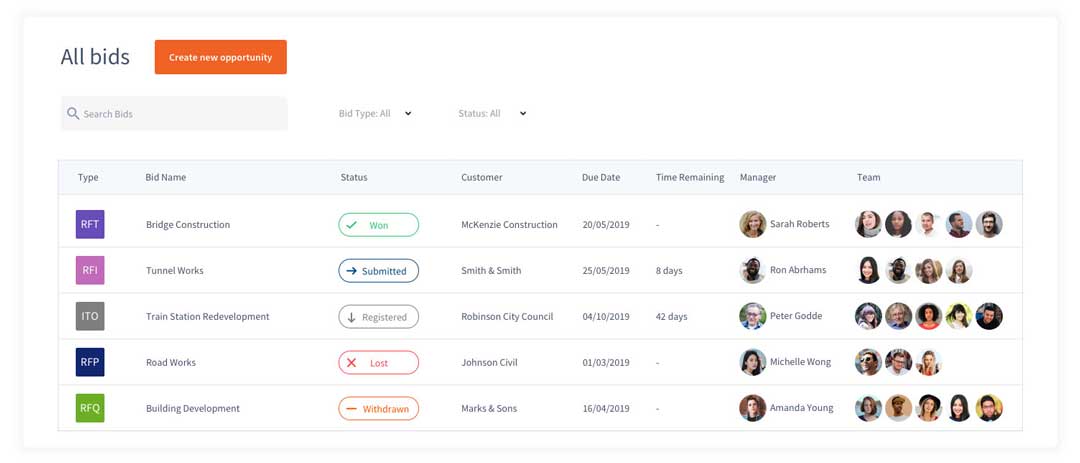Bid Opportunity Management – Finding Opportunities
Why is it important?
You’ll achieve commercial results faster by implementing and continuously improving your bid and proposal process with data that follows the end to end bid lifecycle.
Having a central bid registration or opportunity management system helps you to build a pipeline of opportunities so that you can see what tenders being released to the open market, and when. Having full visibility across your opportunity pipeline also helps your organisation to selectively bid, and provide transparency into past Bid/No bid decisions; and ultimately whether the opportunity was won or lost, and why.
Being able to monitor market opportunities is important for several reasons. Firstly, it enables you to keep abreast of the relevant legal, regulatory and technical requirements that are expected to comply with in your bids, as well as in the project/service delivery.
Secondly, as procurement frameworks and purchasing thresholds (minimum buyer standards, policies and preferences) change, you can remain at the forefront of industry trends; and thirdly it provides tremendous insight into activities of potential customers and competitors as well as ensuring that your bid targets are in line with your organisation’s business strategy and its attitude to risk management.
Bid opportunity management objectives
Having a central record of opportunities is a key component to your overall business development activity for three reasons:
- To manage your pipeline to identify potential new business
- To manage business development resources, and
- To manage potential conflicts across the business.
Bidhive maintains your database of all bidding opportunities that your organisation has considered in the past including the Bid/No Bid decisions and whether the contract was won or lost (or cancelled by the customer).
Once you have committed to bid for an opportunity you can manage team inputs and deliverables, including automated milestone alerts to ensure the bid is moving towards the deadline.
Essential tools
RFx Invitation
Subscribing to a tender search and notification service does a lot of the heavy lifting for you. It will provide contract opportunities that are relevant to your business and in line with the search terms and phrases you nominate.
As well as registering opportunities that you source yourself, Bidhive’s Bid Opportunity Management module enables you to scan the market for open contract opportunities and pull this data directly into your Bidhive so that you can also qualify them before committing time and resources to bid.
This automation improves search efficiencies; reduces manual data entry; and allows you to join up your data between opportunity and contract award. You can learn more about Open Contracts here.
Once a bid opportunity has been registered in Bidhive, you can upload the RFx invitation and other documents provided by the customer to a document library linked to the opportunity. You can add more documents as they come to hand, including addendum issued by the customer.
This provides you with full visibility of all issued documents throughout each stage of the bidding journey. It is important that the bid team can readily access all instructions and requirements, including any addendum issued.

Say goodbye to Excel and manage your bid opportunity pipeline in one place.
Industry briefings or tenderer Q&A sessions
In addition to issuing an RFx, sometimes the procuring organisation (particularly government organisations) will hold a special briefing so that all prospective tenderers can be given an overview of the procurement process, scope of work, contract details and timeframes.
This is a forum where you can seek clarification on questions around the process or scope. Usually there is a formal ‘question and answer’period where tenderers can seek clarification on aspects of the RFx.
TIPS for briefings
Pre-tender meetings can be large affairs where you’ll share the floor with several fellow tenderers. It’s a time when you can gain useful insights into the customer’s thinking and get a feel for the competition.
Handled wisely, the pre-tender meeting can offer a valuable early chance to make the customer aware you are tendering and investing resources in understand their needs. But you should also always be conscious that the competition is watching and be wary of giving away your tender strategy.
To get the most out of the meeting it’s a good idea to:
- Choose a good position in the room. Not too close to the customer – the tender panel will want to maintain a visible sense of fairness and may feel uncomfortable about focusing on the company closest to them.
- Keep questions concise and relevant. Stand up to ask your question if the room is crowded and always introduce your company and yourself clearly at the start.
- If numbers are permitted, take along another person to make notes and capture any valuable information which may improve your final bid. If you are looking for the right opportunity to speak, it’s often difficult to take in everyone else’s comments.
During current social distancing times, many industry briefings are being conducted virtually, and the same rules could apply. If you do not wish to make yourself known to the room, change your video-conference ID for the meeting.
Questions during the tender period
Most RFxs provide very specific instructions about how you can ask questions during the tender clarification period, with questions usually required to be submitted:
- In writing
- Via a portal or sent to a specific email address
- Within a specific timeframe or on a due date.
Most RFx state that asking questions by any other means (for example through a contact you may have within the procuring entity) can risk your bid being disqualified.
Customers will invite registered bidders to send questions in within a specific due date so they have enough time to compile answers and distribute them back to all other registered bidders at the same time.
Sometimes this will result in addendum being issued. And addenda is a change or alteration to any part of the original tender documentation. This may be a clause, or a clarification around the scope of work if there are ambiguities or inconsistencies. It is not uncommon for large, complex tenders to issue multiple addenda.
It is often mandatory (and at least best practice) to acknowledge every addenda in your final bid document that was issued, including the subject title, and the date of release. Acknowledge receipt of the addenda ensures that you have read and understood every part of the tender package (including all addendum!)
Bidhive allows users to register the Q & A deadline in the Opportunity Register. Alternatively, if this information is not immediately known it can be registered as a Key Milestone in the Bid Tracker at a later time.
See it in practice
Other topics
Pre-bid
- Bid Opportunity Management
- The Capture Process
- Bid/No Bid Decision
Bid
Post-bid





